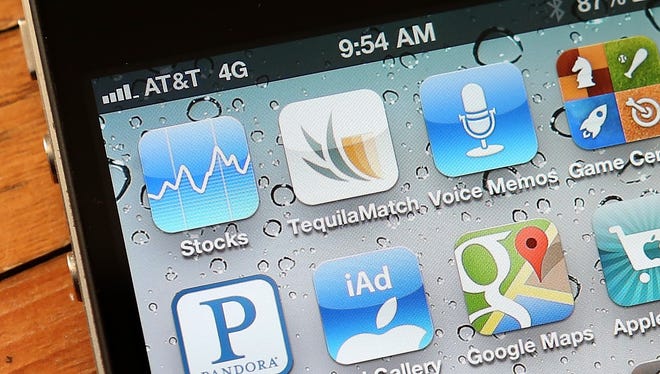

Apps used to be fun add-ons to get the most out of your phone. Today, they’re vital to our everyday communication, work, and play.
Sadly, it seems like every week, there’s another list of bad apps causing headaches or putting your security at risk. Phony cryptocurrency and financial apps are scammers’ latest grift. Tap or click for red flags that the app you’re about trust your money with is a sham.
While we’re talking smartphone security, there are five tweaks every iPhone user should make. Tap or click for steps to see which apps are spying, hide your location, and close down access to your camera roll.
Now it's time to open up your app list and start deleting the rogue ones.
1. Game and puzzle apps
Most people don't put much thought into downloading free puzzles and game apps. But, unfortunately, that can come back to bite you in a big way when malware and other dangerous code are hiding.
Apps spreading malware want to reach as many people as possible, so it’s not uncommon to see ads for them across social media. That includes games called Rugby Pass, Flying Skateboard and Plant Monster. Tap or click for a full list of 21 bad gaming apps you need to remove from your device.
It's not just malware. Most games collect far more information than you might realize. For example, take the super popular Words with Friends.
This game collects the following data: purchases, contact info, user content, identifiers, diagnostics, location, contacts, browning history, usage and “other data.” I’ll stick with real-life Scrabble.
With precise cropping and auto light adjustments, this scanner app quickly shot to popularity. CamScanner even has an ID scan template, so employees filling out new hire paperwork can quickly scan and upload sensitive documents.
Now, hold on a minute before you trust this free app with your driver's license, financial documents, and Social Security number.
Back in 2019, cybersecurity researchers found malicious code in the Android version of the PDF creator app. The bad code came from a third-party advertising library. The app was updated, removing the offending software development kit, and later returned to the Google Play Store. Still, you may choose to stay away because you don't need it.
What can you use instead? For iPhone users, the installed Notes app does everything you need when it comes to scanning. Tap or click for pro tips to get the most out of it.
For Android, try the Google Drive app. Hit the plus icon in the corner, then tap Scan. Easy!
3. Sketchy astronomy app
Astrology lets you peer into the stars to see why you are the way you are. Well, maybe. But download Astro Guru: Astrology, Horoscope & Palmistry, and you’re in for a whole lot of data sharing.
Check Point Research says the app, which has over 10 million downloads, didn’t properly lock down user data, including usernames, dates of birth, gender, location, email addresses and payment details. Yikes. Best to get rid of it.
DIGITAL CLEANUP: Delete old accounts you don't use, clear out your photo gallery, and clean your browser settings. Tap or click for simple steps to get all that and more done.
4. Find another way to fax
Here’s another find from research firm Check Point Research. iFax is a popular app that allows you to send, you guessed it, faxes straight from your phone.
Researchers found exposed cloud storage access keys that allowed access to faxed documents. As a result, malicious actors could gain access to documents sent by the app's 500,000-plus users. That could be a very bad thing if you're sending, say, signed financial documents that include sensitive information.
Looking for an alternative? FaxZero is free if you send no more than five faxes per day and only three pages at a time. There’s a FaxZero ad on the cover page, but that doesn’t matter much. To send up to 25 pages per day with no ads, it’s $1.99 per page.
If you need to receive a fax, eFax gives you a virtual fax number to receive for free up to 10 faxed pages per month. There are paid options, of course, should you go over the free plan.
Not everything free is after your personal info. Tap or click for 15 tech upgrades you can get for free.
5. Say no to this logo creator
Check Point Research found another app with an open, real-time database: Logo Maker - Free Graphic Design & Logo Templates. The free app has a ton of downloads and great reviews. You would never know it could expose your info to anyone willing to look for it.
That includes email addresses, passwords, usernames, and user IDs. Take this as a great reminder to set unique logins for all your accounts, even apps you may not access much.
Imagine you download Logo Maker and set the same password you use for your bank website. Once a criminal gets their hands on your password, it’s easy to check other accounts using the same credentials.
Looking for photo editing software without Photoshop prices? Browse a list of free alternatives for every skill level.
6. An unsecured screen recorder
Recording your screen can be handier than a static screenshot, but be careful how you get the job done. Screen Recorder, which has over 10 million downloads, exposes recordings made by users. Check Point says the app stores screen recordings on a cloud service. That’s convenient, but researchers say, “there can be serious implications if the developers embed the secret and access keys to the same service that stores those recordings.”
Sure enough, Check Point’s research team recovered the keys that opened up access to each stored recording.
Of course, you don’t need a separate app for this. The functionality is built right into your phone. Tap or click for steps to record your iPhone screen. Tap or click to record on your Android.
7. Data-hungry Facebook
Think about how valuable your data is to Big Tech companies. Why else would they give you access to so many services for free? Facebook is a prime example. Here’s just a bit of what the app tracks:
- Your contacts, call logs, and text messages
- Your location
- Your internal storage
- Your camera and microphone
Facebook wants extensive access to your device. It wants to track where you go (online and in person), what you search for, and what you buy. Then, it uses that data to serve you targeted ads. Don't mind the ads? All right. But Facebook is no stranger to data leaks, either.
Earlier this year, 533 million Facebook user records were exposed. Tap or click here for a tool you can use to check if Facebook leaked your info.
8. QR code scanners
When you download a third-party scanning app, you're clogging up your phone. Still, many people gravitate toward these programs. So instead of rolling the dice and giving up even more of your personal info, use your phone's built-in resources.
On Android, open your camera app, point it at a QR code and hold steady for a few seconds.
If a notification appears, tap on it. If you don’t get a notification, go to Settings and enable QR code scanning.
To scan a QR code on your iPhone, open the camera app and hover over the code. Your smartphone will automatically direct you to the code’s link.
Did you know QR codes are an easy way to share your Wi-Fi password without having to type it out? Tap or click here for instructions to set it up.
9. More than just dance moves
TikTok is famous for its quick viral videos – everything from dances to dangerous stunts. But when children compete for the most viral clout, they’ll go to any lengths. One 10-year-old Italian girl strangled herself to death in a viral “blackout challenge,” AP News reported. A 12-year-old Colorado boy also died while participating in a "blackout challenge" in April.
All parents to know the perils of TikTok. Your child may tell you they're on TikTok to hang out with friends and dance, but every kid is susceptible to peer pressure. If they see social media stars they admire partake in dangerous games, they may want to follow in the crowd's footsteps – often at the expense of their safety.
If you have a kid at home, say goodbye to TikTok. Even if you use it on your phone, the kids may be inspired to download it for themselves.
10. Light it up
When smartphones first came out, flashlight apps were a must. Not anymore since this feature is built-in to phones now.
Many app designers added shiny new features to keep users around and keep tracking all that data. Take iTorch Flashlight for iPhone, for example. The free app tracks your location, personal identifiers, usage data and diagnostic info. That's a lot to give up just to use a flashlight.
Bottom line: Ditch the flashlight apps on Apple or Android phones. You don’t need them, and your native flashlight app is just as good.
Bonus Tip: Do you have more photos than you know what to do with? Check out my podcast “Kim Komando Explains” on Apple, Google Podcasts, or your favorite podcast player.
In one episode that’s trending, I dive into the best ways to eliminate all the junk and duplicates – like memes and screenshots – hiding the important pictures you want to keep. Plus, how to backup and store your collection for easy browsing and long-term storage.
Learn about all the latest technology on the Kim Komando Show, the nation's largest weekend radio talk show. Kim takes calls and dispenses advice on today's digital lifestyle, from smartphones and tablets to online privacy and data hacks. For her daily tips, free newsletters and more, visit her website at Komando.com.
The views and opinions expressed in this column are the author’s and do not necessarily reflect those of USA TODAY.
Source link







